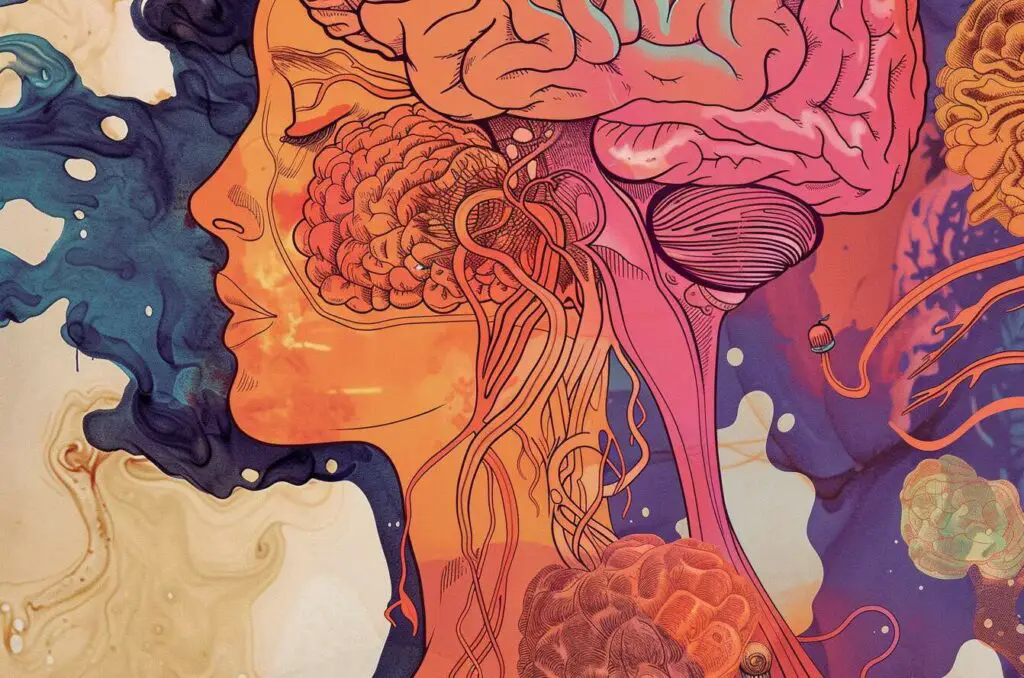Are you among the millions who grapple with the uncomfortable and unpredictable nature of Irritable Bowel Syndrome (IBS)? Have you tried Cognitive Behavioral Therapy (CBT)?
CBT and psychological intervention can help with treating the causes of IBS symptoms and improve your quality of life, offering an approach that goes beyond traditional medical methods. A holistic, multifaceted IBS management approach prioritizes psychological well-being alongside physical health.
This guide is for individuals with IBS looking for alternative solutions to improve quality of life. We explore how CBT, combined with conventional medical therapies, can give hope to people with IBS.
We cover the basics of Cognitive Behavioral Therapy, the gut-brain connection, and how CBT can help manage stress-induced IBS symptoms. We also compare it with other psychological interventions like gut-directed hypnotherapy and online CBT.
Continue reading and let’s unlock the potential of Cognitive Behavioral Therapy for your better, brighter tomorrows.

Key Takeaways
- Cognitive Behavioral Therapy (CBT) Targets Thought and Behavior: CBT isn’t just about delving into your inner thoughts – it focuses on transforming your thoughts to reshape your emotional and behavioral responses, offering practical, goal-oriented strategies.
- The Gut-Brain Connection in IBS: IBS triggers go beyond just what you eat; stress and emotions play a starring role. The gut’s extensive network of neurons is deeply influenced by emotions and mood, making it essential to consider both physical and emotional components in IBS management.
- CBT as a Game-Changer in Managing IBS: CBT, specifically adapted for IBS, offers concrete strategies to address and mitigate psychological distress that often accompanies IBS, leading to a substantial reduction in both the frequency and severity of symptoms.
- Complementary Approach: Gut-Directed Hypnotherapy: Alongside CBT, Gut-Directed Hypnotherapy is an effective supplemental tool, introducing mind-body relaxation techniques to ease gut discomfort and manage stress and discomfort, but talk to a qualified therapist before trying.
- Exploring Online CBT for IBS: Online CBT has emerged as a convenient and effective alternative, offering structured lessons, therapist support, interactive tools, and group sessions, making behavioral therapy for IBS accessible from the comfort of home.
- CBT vs. Gut Hypnotherapy: Which Works Better?: Both CBT and Gut Hypnotherapy have shown efficacy in reducing IBS symptoms and improving quality of life, and the choice between the two often depends on patient preference, previous experiences, and healthcare provider expertise.
- CBT’s Promising Role in IBS Management: CBT has shown promising results in managing IBS symptoms by reducing gastrointestinal symptoms and severity of IBS pain, improving psychological well-being, and reclaiming feelings of control and quality of life for individuals with IBS.
What is Cognitive Behavioural Therapy (CBT)?
Cognitive Behavioral Therapy (CBT) is a form of psychotherapy that’s all about changing thought patterns and behaviors. It’s like hitting the reset button on your brain.
In CBT, individuals work with a therapist to identify and challenge negative thought patterns and beliefs. This can help to alter how they feel and behave. It’s like rewiring your brain to think differently, which in turn changes how you act.
For IBS, CBT can be a game-changer. It’s been shown to reduce the severity and frequency of symptoms, as well as the impact on daily life.
CBT isn’t a quick fix; it takes time and practice. But it’s a powerful tool that can help you better manage stress, anxiety, and the gut-brain connection that’s so crucial in IBS.
The Gut-Brain Connection: Understanding the Role of Stress and Emotions in IBS

The gut and the brain are in constant communication, and this relationship is known as the gut-brain connection. In people with IBS, this connection can be particularly sensitive. Stress and strong emotions can directly affect the gut and cause symptoms of IBS like abdominal pain, bloating, and changes in bowel habits.
Chronic stress can cause the release of hormones and chemicals that disrupt the digestive system. Similarly, strong emotions like anxiety or sadness can also affect the gut-brain connection, leading to IBS symptoms.
- Practice Stress-Reducing Techniques: Engaging in activities like deep breathing, meditation, or yoga can help reduce stress and calm the gut.
- Identify Emotional Triggers: Keep a journal to track emotional triggers and IBS symptoms. This can help identify patterns and manage emotional responses.
- Seek Support: Talking to a therapist or counselor can help in developing coping strategies for managing stress and emotions.
- Prioritize Sleep: Getting enough sleep and quality rest is important for managing stress and emotions. This can have a positive effect on gut health.
Understanding this relationship can empower individuals with IBS to take a more holistic approach to managing their symptoms. By addressing both the physical and emotional aspects of IBS, individuals can often find relief and better quality of life.
To manage the effects of stress and emotions on gut health, individuals can use stress-reducing techniques, identify emotional triggers, seek support, and prioritize sleep.
How CBT Helps Manage IBS Symptoms
How CBT Helps Manage IBS Symptoms
CBT and its adaptation for IBS specifically, is a game-changer for many sufferers. It’s important to train your mind to react differently to triggers related to your gut, not just understanding how thoughts and actions interact.
Here’s a closer look at how CBT can be a valuable tool in your arsenal:
- Anxiety and IBS: CBT targets the anxiety that often accompanies IBS. Changing negative thought patterns can help stop the cycle of anxiety and gut symptoms reinforcing each other.
- Coping Strategies: CBT teaches practical coping strategies like deep breathing and mindfulness to help manage the physical and emotional effects of IBS. These strategies can help you feel more in control and reduce the impact of symptoms on your daily life.
A study in The American Journal of Gastroenterology found that CBT for IBS reduced symptoms and improved patients’ quality of life.
The key is consistency and patience. Just like building physical muscle, training your mind to respond differently to IBS symptoms takes time and practice. CBT changes how people perceive their IBS, often resulting in fewer and less severe symptoms.
Gut-Directed Hypnotherapy: A Complementary Approach to CBT for IBS

Gut-Directed Hypnotherapy is a credible psychological treatment for IBS, despite the initial association with stage performers swinging pocket watches. This under-the-radar therapy engages the power of the mind to regulate gut sensations, often reducing the severity of IBS symptoms.
Benefits include reduced abdominal pain and bloating and improved overall quality of life for some. This form of hypnotherapy helps those with IBS better manage stress and discomfort, two major triggers for this chronic condition.
It’s not meant to replace traditional medical treatment. Think of it as a helpful addition to your IBS management plan.
- Gut-Directed Hypnotherapy: Introduces mind-body relaxation techniques to ease gut discomfort.
- A Complementary Psychological Treatment: Works in tandem with medication and dietary changes, fine-tuning the body’s response to IBS.
- Reduced Abdominal Pain and Bloating: Hypnotherapy can help reduce abdominal pain and bloating by addressing the pain signals sent from the gut to the brain.
- Improved Quality of Life: Hypnotherapy sessions can improve the quality of life. People experience better mood, improved sleep, and increased comfort in socializing.
If you’ve tried common treatments for IBS but still struggle with it, consider trying Gut-Directed Hypnotherapy for relief. Make sure to work with a qualified therapist who has experience in this specific area. Keep in mind that the results will vary depending on your individual IBS symptoms.
Does CBT for IBS Work Online?
CBT for managing IBS has emerged as a convenient and effective alternative for patients. Studies suggest that it can be just as effective as in-person sessions, offering similar benefits in a more accessible manner.
Online CBT generally involves structured modules and guidance from a therapist, delivered through web platforms or mobile apps.
Here’s more of what you can expect if you choose the online route for CBT:
- Structured Modules: Online CBT programs usually have organized lessons that cover various topics on managing IBS symptoms. From understanding triggers to implementing dietary changes, these modules provide a systematic approach to behavioral therapy. This setup allows patients to progress at their own pace and review the material as needed.
- Therapist Support: Online CBT usually provides therapist support, even though it is conducted remotely. Patients can use chat sessions, phone calls, or video calls to connect with professionals and seek guidance. Regular check-ins can enhance accountability and provide tailored support to address individual worries and anxiety related to IBS.
- Interactive Tools: Online CBT programs provide educational content and interactive tools to help patients apply learned strategies in real life. You can keep a food diary to find out what triggers your IBS. Also, try relaxation techniques to manage stress and anxiety. These are common factors that contribute to IBS.
- Group Sessions: Some platforms also organize group sessions that allow patients to learn from each other and share their experiences. This can create a sense of community and encourage open discussions, which can be helpful for navigating IBS.
it’s important for patients to choose reputable online CBT programs that are specifically tailored for IBS. Working with a healthcare provider to identify a program that suits individual needs and preferences is also recommended.

CBT vs. Gut Hypnotherapy: Which Works Better for IBS?
When it comes to managing IBS, both CBT and Gut Hypnotherapy have shown promise. CBT focuses on identifying and changing negative thought patterns and behaviors, which can help reduce IBS symptoms. On the other hand, Gut Hypnotherapy uses relaxation and visualization techniques to calm the gut-brain connection and alleviate symptoms.
CBT is effective in reducing IBS symptoms and has long-term benefits. Gut hypnotherapy can improve quality of life for IBS patients and lessen symptoms.
The big question: Which one is better? Well, it’s not a one-size-fits-all answer. Some individuals might respond better to CBT, while others find more relief with Gut Hypnotherapy. In fact, a combination of both CBT and Gut Hypnotherapy has also been explored, showing promising results in some studies.
So, how do you know which approach is right for you? It’s all about personal preference and what resonates with you. Both CBT and Gut Hypnotherapy are non-invasive and can be tailored to your specific needs. Discussing these options with a healthcare professional can help you determine the best course of action.
The most important thing is to find a management strategy that works for you and relieves IBS symptoms. Whether it’s CBT, Gut Hypnotherapy, or a combination of both, the goal is to improve your quality of life and give you back control over your gut health.
How Effective is Cognitive Behavioral Therapy for IBS?

Research suggests that CBT is a valuable tool in managing IBS symptoms. A 2018 study in the American Journal of Gastroenterology found that CBT can significantly reduce IBS symptoms and improve overall quality of life.
But CBT isn’t just about physical symptoms. It also addresses the psychological distress often experienced by IBS patients. This is crucial, as stress and anxiety can exacerbate IBS symptoms.
By tackling negative thought patterns, CBT helps patients develop healthier coping strategies. This leads to a reduction in stress and anxiety, creating a positive ripple effect on both mental and physical health.
CBT isn’t a magic wand that makes IBS disappear, but it’s a powerful tool for better managing the condition. It’s like giving your mind and body a new, more effective instruction manual.
So, if you’re feeling overwhelmed by the psychological toll of IBS, CBT can be a game-changer. It’s not just about surviving with IBS; it’s about thriving despite it.
Final Thoughts: The Role of CBT in Holistic IBS Management
The art of harmonizing the interplay between thoughts, emotions, and our gut responses showcases a promising domain in IBS management.
CBT provides a practical toolkit that helps us change our mindset and approach challenges more effectively. CBT helps you change negative thinking patterns to positive ones, which can greatly reduce IBS symptoms and improve your life.
And should you decide to explore online CBT or even complement it with Gut-Directed Hypnotherapy, know that a growing array of tools are emerging to make this journey more accessible and personalized.
Rewriting the mind’s script can improve the communication between the gut and brain. With strong testimonies, CBT could be key to a better tomorrow for those with IBS.
Consider trying CBT as part of your IBS management journey. It may help you feel more comfortable and balanced.
Check out these other IBS treatment options for relief:
- IBS Medications
- IBS Supplements
- Popular Alternative Therapy IBS Treatment Options
- Top Herbal Remedies for IBS
IBS and Behavioral Therapy FAQs
1. How does cognitive behavioral therapy (CBT) help with IBS
CBT addresses the intricate relationship between our thoughts, feelings, and behaviors. In the context of IBS, the focus is on addressing negative thought patterns that can worsen symptoms and providing effective coping strategies to improve the situation. This can reduce anxiety, help manage stress, and improve the overall quality of life for people with IBS..
2. Is CBT effective for all types of IBS symptoms?
Yes, CBT has displayed effectiveness in managing an array of IBS symptoms. This includes pain, diarrhea, and constipation. CBT helps by addressing emotional and psychological factors that affect physical symptoms, leading to reduced symptoms and better quality of life.
3. Can CBT be combined with other IBS treatments?
Yes, CBT is typically integrated with other IBS treatments like dietary changes, medications, and complementary therapies. This multi-pronged approach can be incredibly effective, addressing not just the physical symptoms of IBS but also the psychological triggers and responses that exacerbate them.
It’s all about finding the right balance that works for the individual – whether it’s through medication, lifestyle changes, or CBT. By combining CBT with other treatments, a person can more effectively manage their IBS symptoms for a better quality of life.
4. What should I expect from an online CBT program for IBS?
Online CBT programs for IBS customarily offer structured therapy sessions, along with assorted homework assignments, and consistent therapist communication via secure online platforms. This creates an interactive, yet remote, environment enabling personalized treatment strategies for each individual’s IBS needs, without the necessity for in-office visits. Therapy via online platforms can be just as effective as traditional face-to-face CBT, allowing those struggling with IBS the freedom and comfort to engage in therapy on their terms.
5. How long does it take to see results from CBT for IBS?
Results from CBT for IBS can vary, but many patients notice symptom improvement within a few sessions. Unlike medication, which often takes several weeks to kick in, the effects of CBT might be noticed sooner due to its focus on changing thought patterns and behaviors.
However, the full benefits of CBT generally unfold gradually over the course of weeks to months, as patients develop and solidify coping strategies. Every individual case is different, but consistency in attending sessions and practicing techniques at home can expedite the positive effects.
6. What Kind of Therapist Treats IBS with Behavioral Therapy?
Typically, a gastroenterologist or your primary care physician will refer you to a psychologist or a therapist who specializes in Cognitive Behavioral Therapy (CBT). Look for a therapist who has experience with health-related anxiety and medical conditions.
7. Can IBS Be Managed Through Behavioral Therapy?
Short answer: Yes, it can be. It’s not about addressing the physical aspect as much as it is about understanding and managing the psychological factors that contribute to IBS symptoms. By working with a therapist, you can learn relaxation techniques, stress management, and cognitive strategies to cope with the condition, reducing the severity and frequency of flare-ups.
8. Will Insurance Cover IBS Behavioral Therapy Sessions?
Some insurance plans do cover behavioral therapy for IBS, as it’s increasingly recognized as a legitimate treatment option. It’s always best to check with your insurance provider or the therapist’s office about coverage.
9. How Long Does Behavioral Therapy Treatment for IBS Last?
Treatment can vary depending on individual progress and the severity of the condition. However, in general, initial therapy may last for 10 to 12 sessions. After that, some people may benefit from occasional follow-ups.
10. Can You Take Medication Alongside Behavioral Therapy?
Absolutely. Medication can be used in conjunction with behavioral therapy to manage IBS symptoms. Your psychologist and gastroenterologist will typically work in tandem to customize the best treatment plan for you.
- https://www.ncbi.nlm.nih.gov/pmc/articles/PMC3870505/
- https://www.gastrojournal.org/article/S0016-5085(19)41447-9/fulltext
- https://www.ncbi.nlm.nih.gov/pmc/articles/PMC1773844/
- https://www.ncbi.nlm.nih.gov/pmc/articles/PMC4015203/
- https://www.ncbi.nlm.nih.gov/pmc/articles/PMC9849985/
- https://www.ncbi.nlm.nih.gov/pmc/articles/PMC8626893/
- https://www.ncbi.nlm.nih.gov/pmc/articles/PMC5416658/
- https://pubmed.ncbi.nlm.nih.gov/34847963/

